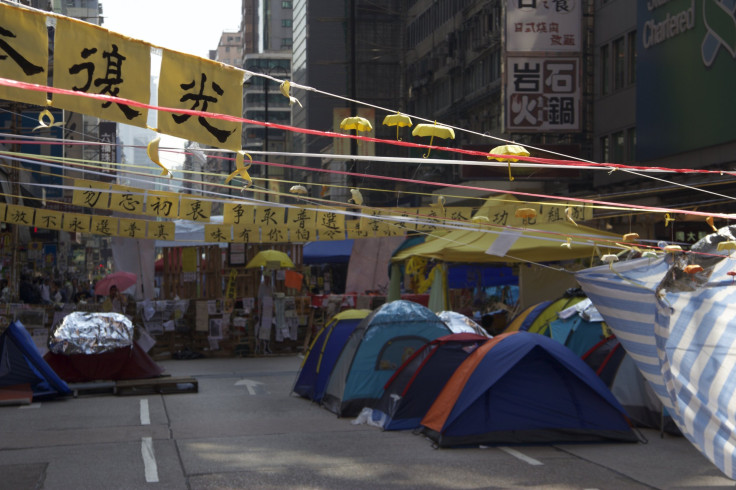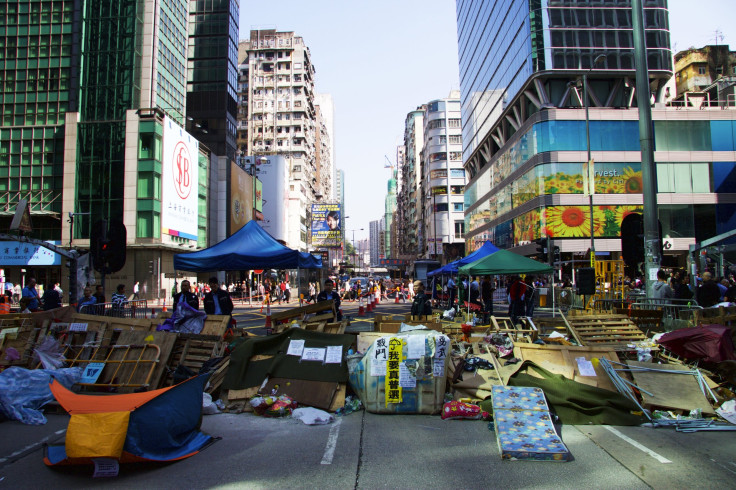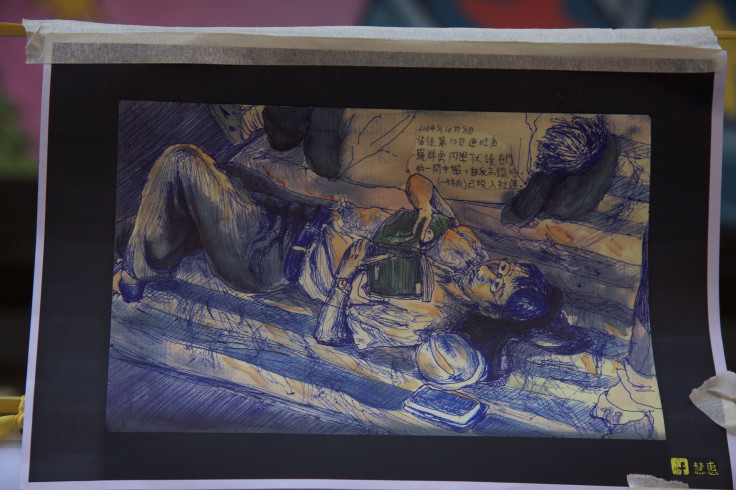Hong Kong Protests: Occupy Central Site Faces Eviction Threat, But Protesters Plan For Long Fight

HONG KONG -- The Occupy Central protest site in Mong Kok is calm -- for now. Protesters sleep on plastic mats under makeshift tarpaulins, lounge in a pop-up library, or busy themselves securing supplies for the many "resource stations" that help keep the site running.
Even opponents of the protests, groups of old men who congregate on street corners, as well as groups of police officers, seem relaxed, chatting and arguing with demonstrators with no more animosity then they would display over a dispute in a game of mahjong. Despite the calm atmosphere, the threat of evictions hanging over the Occupy protest site in Mong Kok has protesters planning their next move, and going home does not appear to be on their agenda.
Police in the city successfully removed protesters from part of one of Hong Kong's three protest sites on Tuesday, acting in support of bailiffs who were enforcing an injunction obtained by the owners of an office building.
Now protesters in Mong Kok face a similar action, possibly as early as tomorrow. A road where a small part of the protest site is located is set to be cleared in a similar manner by bailiffs, reportedly with back-up from 3,000 police officers. However, demonstrators on the streets in Mong Kok seemed determined on Thursday, to continue their protests, despite the threat of police action.
“I will fight until the last moment,” said Wing Yim, 23, a telecommunications worker. “If police move me from Mong Kok, I will go to [the main protest site at] Admiralty.”

Yim did not have kind words for the law. “Police here can't control themselves. We are peaceful, and they push us, they fight us and they beat us,” he said, adding that he had been struck with a baton and pepper-sprayed by officers in the past 50 days that he has been a part of the Occupy movement.
The threat of at least partial evictions and of authorities using civil injunctions to chip away at the protests, appeared not to have fazed many of the people at the Mong Kok site.
“If they want to clear us, we can come back after,” said Caitlin, 18, a shop worker. “I don't think the government will give us what we want. There might be a chance... but we will stay here.
"If the police ask me to leave, I won't go.”

Caitlin's tent-mate Mei added: “If the police try to clear us, I think some people will allow themselves to be moved, but some will be angry.”
In the past, attempts to remove or confront protesters with force have backfired on the authorities. Footage showing police using tear gas and batons against demonstrators on Sept. 28, the first night of the protests, was a publicity blow to the police and the government of chief executive Leung Chun-ying.
In addition, previous attempts to clear the Mong Kok protest site have had precisely the opposite effect of the one intended by authorities. Official actions, aimed at removing protesters, have only caused a groundswell of support that greatly increased their numbers.
“If the police try to clear us, we will defend the movement, but we won't fight with them. I think if they try to clear us, most people will let them do it, but we will just go to the other side (of the street),” said Keith Cheung, 29, a financial planner with an insurance company, who said that he has visited the Mong Kok protest site every day.
While Cheung, and almost all the other protesters that International Business Times spoke to Thursday, seemed determined to carry on their fight, one theme that ran through all conversations was pessimism about the government acceding to their demands.
“I think most of us think that maybe we can't get all that we want, but now it's 0 percent -- if we want 100 percent, maybe if they give us 50, 40, 20, I could accept that," said Cheung. “Maybe there is only a small chance of success, but if we leave before they force us then we lose.”
© Copyright IBTimes 2025. All rights reserved.






















